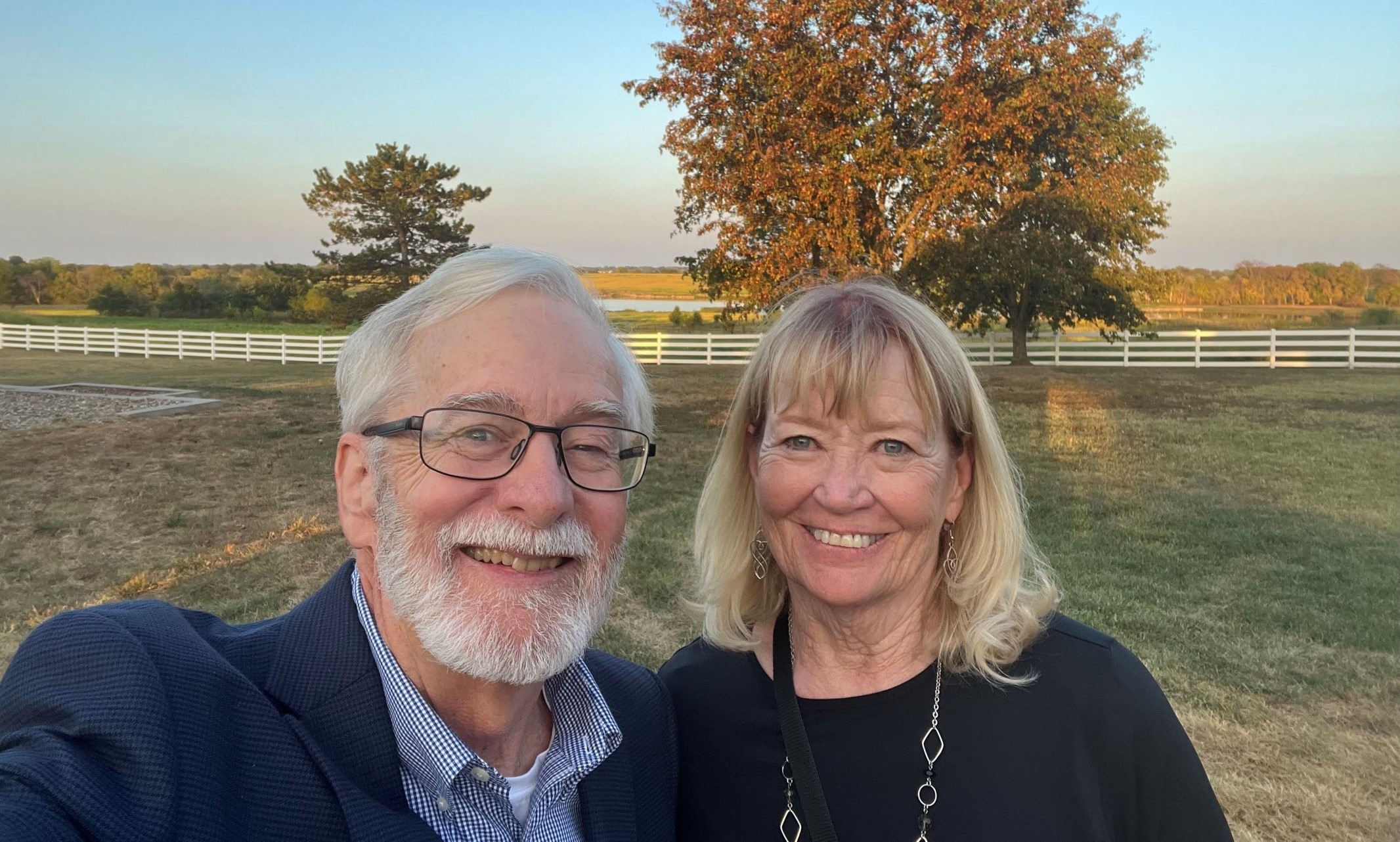
The Institute for Urban Education showcases impressive industry and retention statistics
Do you know how far giving can go? Here at the University of Missouri-Kansas City, many of our students and programs thrive because of our donors’ generosity. Their gifts impact all aspects of the university, and those resources change lives everyday.
Dana Reel and Nancy Reel (B.A. ’77) are both Kansas City natives, with Nancy graduating from UMKC with a degree in elementary education. The Reels came in contact with the UMKC Foundation in 2015 when they first established a scholarship in the then College of Arts and Sciences, now School of Humanities and Social Sciences, in honor of Dana’s sister and brother-in-law who attended UMKC. The couple learned about the Institute for Urban Education, commonly called IUE, a program dedicated to supporting educators in historically underserved schools in urban communities, through their communications with the university when they expressed a desire to expand their giving. The Reels wanted to provide more opportunities to underrepresented populations in Kansas City and were incredibly inspired by the IUE. They were impressed with the program’s leadership, mission and achievements. “Hearing about the program for the first time was so refreshing,” Dana said. “I’ve never heard of a program as exceptional as the IUE. We went to one of their events and were so impressed with how it was structured. Every student and teacher we met were so excited and jazzed about their careers and they all had such good camaraderie.”IUE scholars in the program not only receive a scholarship to support them during school, but also receive additional training focused on teaching in urban schools and are committed to teaching in Kansas City’s public schools for four years after graduation. The program also provides consistent guidance and support even after students start teaching full time. Since its inception, the IUE has given Kansas City talented educators who are highly sought after: 100 % of the teachers who come from IUE who are certified have been hired. This impressive statistic has been true even in the years even before the teacher shortage.
Dana and Nancy Reel chatting with an IUE student
“I'm constantly getting emails and phone calls from school principals and HR directors asking if we have any more IUE teachers,” said Jennifer Waddell, Ph.D., director of the IUE. “They tell me that first year IUE teachers are performing at the level of second- or even third-year teachers. It’s nice to hear that the intense preparation and opportunities we provide not only help them get their jobs, but they execute their jobs effectively as well.”Having 100% of teachers hired isn’t the only impressive statistic the IUE has. The program also boasts extremely high retention rates.“Our teachers’ retention rate is almost three times higher than the state’s,” Waddell said. “Currently, 91% of IUE graduates are still teaching or working in public education at the five-year mark. That is compared to a little less than 50% nationally and 34% in Missouri. On top of that, 100% of our students of color who are from urban communities, our core demographic for recruitment, are still teaching at the five-year mark.”Those numbers left the Reels in awe of the program. “I was a teacher myself,” Nancy shared. “I know that the turnover rates are extremely high in the profession and to have a program that is so supportive even when you graduate really does make a big difference. The teachers who come out of the IUE program stay in the profession for a long time, it’s very exciting and hopeful. I wish more programs like the IUE existed.”The Reels explained that the IUE is a program they specifically give to because they are addressing problems that impact the education of Kansas City’s community and children. They expressed gratitude for their own education and wish to pay it forward. “Kansas City is our home,” Dana said. “We want to make a positive and lasting impact here. Nancy and I are fortunate to be able to give financially, it’s truly a blessing. There is a huge need for scholarships and financial aid, and we are just happy to be involved and provide some opportunities.”
Jennifer Waddell, Ph.D., on the left at an IUE event
Waddell expressed how grateful the IUE is with their donors and contributors. “They give us a reason to exist,” Waddell said. “Without the scholarships, we don't have a way to support our students, and we cannot grow our enrollment, much less maintain it. Our students are unbelievable. The teachers they become are nothing short of exceptional and our team members are all here because our donors believe in the mission of the IUE. Their philanthropy and donations make our work possible and help us contribute to the educational landscape of Kansas City.”The Reels shared their satisfaction with the program, especially when they attend events and see dedicated students who are excited about teaching express gratitude to their help. “The schools that these teachers get placed in are extremely lucky,” Nancy said. “They have resources and support that other teachers don’t, and they also have more training because of the IUE. It’s wonderful because ultimately it all goes back to the kids in the classrooms.”The couple said they hope their gift will have a ripple effect for years to come. “I wouldn’t have gotten the job I got without the education I received,” Dana said. “The same goes for Nancy. Scholarships like ours help students focus on their studies. We understand it takes time to study and absorb the material; if we can lighten their financial load, it will only benefit their education and our community. They just need some to help move along, and we are more than happy to do so. We hope they’ll see that and be inspired to give back as part of their future too.”
Oct 30, 2024
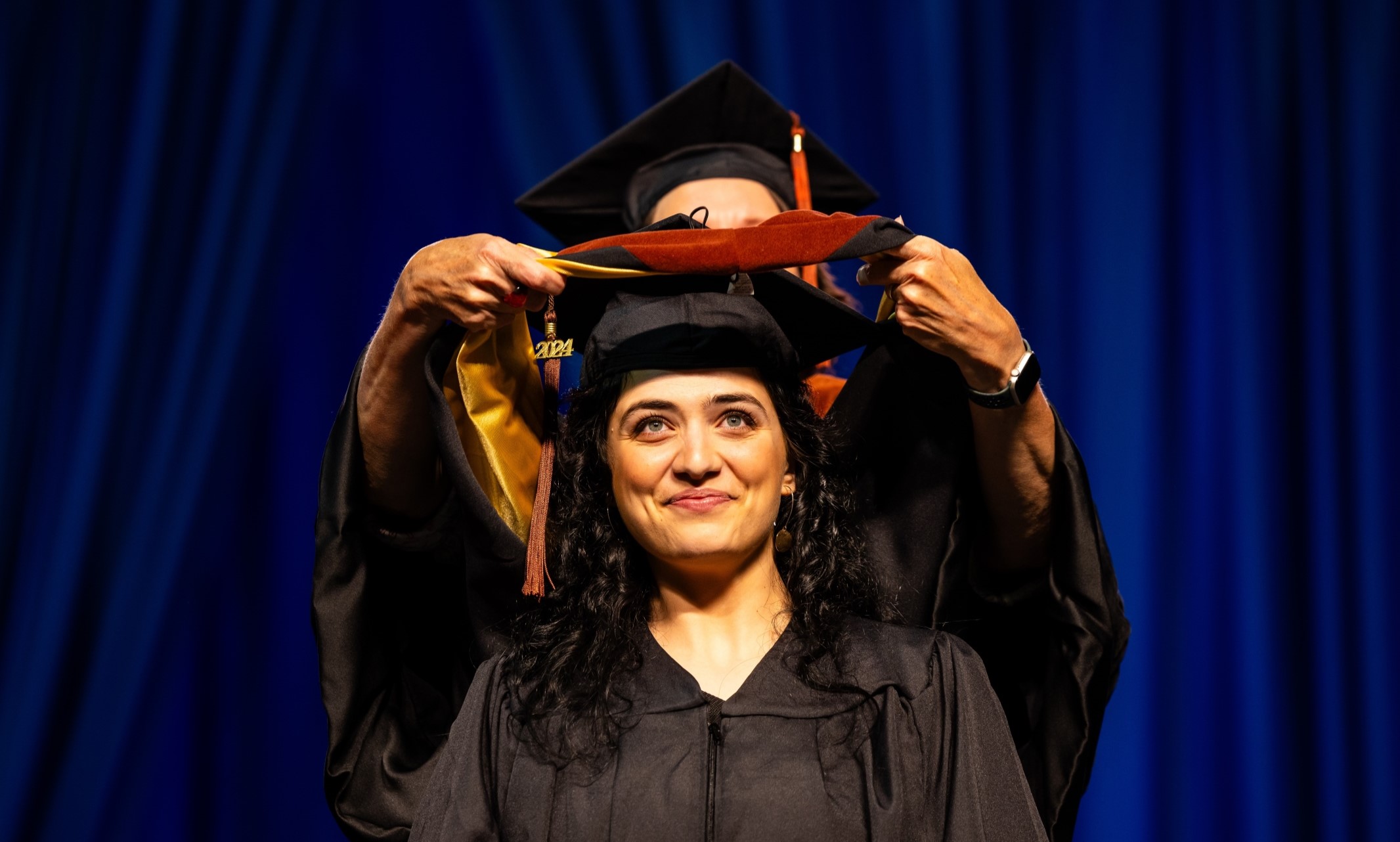
Programs will increase research opportunities and community engagement
The University of Missouri-Kansas City has added eight Ph.D. programs to its curriculum. All of these programs will begin admitting students in Fall 2025. With the addition of these programs, UMKC now offers more than 35 doctoral and professional programs.
The doctoral programs – some that include multiple focus areas – are:
Electrical and Computer Engineering
Mechanical Engineering
Civil Engineering
Computer Science
Economics
Education with focus areas in Curriculum and Instruction; Educational Leadership, Policy and Foundations; Music Education
Humanities with focus areas in English; History
Natural Sciences with focus areas in Biomedical and Health Informatics; Cell Biology and Biophysics; Chemistry; Geosciences; Mathematics; Molecular Biology and Biochemistry; Oral and Craniofacial Sciences; Pharmaceutical Sciences; Pharmacology; Physics
“These programs allow students to earn a globally recognized credential right here in Kansas City,” School of Graduate Studies Dean Christine Getz said. “They combine an advanced disciplinary specialization with opportunities to diversity skills in preparation for a variety of careers in academics, industry, government, education and the nonprofit sector.”
The programs won’t just benefit students. As Kansas City’s university, the impact to the city and larger region is always top of mind when new opportunities are considered.
“When we consider new academic programs, we determine if there is a need in the Kansas City region and how the program will benefit the community,” Chancellor Mauli Agrawal said. “We’re particularly excited about the opportunities for research that our new Ph.D. programs will provide, including bringing more funding and jobs to the community.”
The new degree programs will help move the university toward its goal of attaining Carnegie Research 1 status that would designate the university as having very high research activity. The R1 designation would make it easier to hire additional excellent faculty and attract more students. It also helps with national prestige, leading to more research funding and partnerships with other R1 institutions and organizations in the community. Only 146 universities – or 5% – in the country have R1 status, and none currently do in the Kansas City region.
“The new degree programs better identify the areas in which faculty and students are already researching and working,” said Jennifer Lundgren, provost and executive vice chancellor. “We expect that this clarity will us recruit high-quality faculty and students, as well as boost our research opportunities.”
Oct 29, 2024
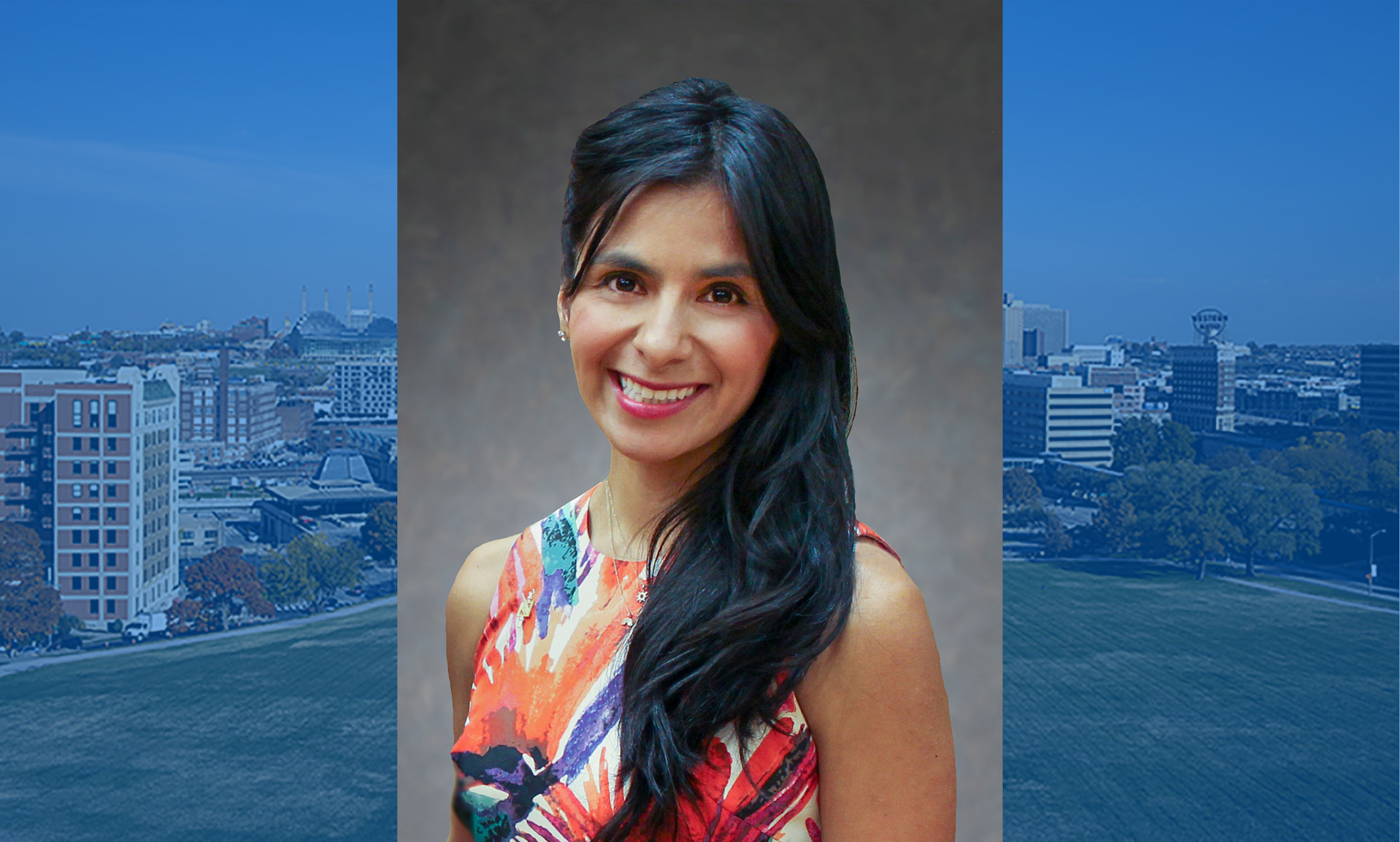
Mayra Aguirre is a Kansas City leader, first-generation college graduate
Mayra Aguirre, president of the Hall Family Foundation, will give the UMKC Commencement address on Dec. 15.
Aguirre has led the organization, which aims to enhance the quality of human life in the Greater Kansas City Area, since 2020. The appointment was a natural fit for Aguirre, who is passionate about serving her community. As the daughter of immigrants growing up in Emporia, Kansas, she watched as her parents worked in manual labor roles to provide for their family. She was the first member of her family to graduate from college, earning a Bachelor of Science in Business Management from Emporia State University. She went on to achieve her Juris Doctorate from he University of Kansas School of Law.Her immigrant and working-class experience instilled a deep and lasting commitment to uplifting under resourced communities, and today Aguirre is known as a dedicated Kansas City leader with a long history of serving the community. Prior to becoming president of the Hall Family Foundation, Aguirre worked for the Mid-America Regional Council Metropolitan Council on Early Learning, and at the Hispanic Development Fund, where she continues to serve on the board and as an advocate and mentor for children, youth and young professionals. She also serves on the boards of the Greater Kansas City Chamber of Commerce, Hispanic Development Fund and KC2026 World Cup. In her role as president of the Hall Family Foundation, Aguirre has worked with the board to join with community partners across the region to support initiatives that facilitate positive impact in the Kansas City community and align with the initial vision of the organization’s founders, Joyce and Elizabeth Hall. That collaboration includes UMKC with the Hall Family Foundation providing $15 million for the construction of the Healthcare Delivery and Innovation Building, which will provide enhanced technology and facilities for students, opportunities for multidisciplinary learning and research and upgraded clinic facilities for the community.
Oct 21, 2024

13 alumni and one family will be honored on April 25
The University of Missouri-Kansas City Class of 2025 Alumni Award recipients include a CEO and founder of a company frequently mentioned in the Kansas City Business Journal, and a family that has made a significant impact in dental healthcare.
Each year, UMKC recognizes a select group of alumni for their inspirational accomplishments. The event is one of the university’s largest events to support student scholarships. In the past decade, the Alumni Awards event has garnered more than $1 million in scholarships and immediate student aid for UMKC.
The Class of 2025 awardees will be honored at a celebration on April 25 at the Student Union.
Alumnus of the Year: Nathaniel Hagedorn
Nathaniel Hagedorn (BBA ’02, MBA ’04) has had a 22-year career in commercial real estate. In 2012, he founded NorthPoint Development, a Kansas City-based commercial real estate development company focused on industrial, multifamily and data center projects. As the CEO of the firm, Hagedorn is responsible for strategically ensuring NorthPoint remains an innovator in data science and technology.
NorthPoint has grown to a team of 400 team members with nine offices across the country and has become the largest industrial developer in the United States, serving most Fortune 500 companies. The company has also invested in more than 8,000 apartment units and is developing several multi-billion-dollar hyperscale data center campuses. NorthPoint has been recognized by the Kansas City Business Journal as a Best Place to Work in Kansas City for 11 years running.
Hagedorn also serves on the NorthPoint Foundation board, which focuses on charitable efforts to support children in need across Kansas City and in the other communities NorthPoint serves across the country.
Spotlight Award: James Mitchell
James Mitchell (B.M./B.A. ’13) has always been passionate about music and the environment. He majored in cello performance and environmental studies and is currently a leading expert in the field of climate finance whose work has shaped the climate strategies of some of the world’s largest banks and investors. He started his career as a researcher at the University of Oxford Sustainable Finance Group, where he published novel research that exposed climate and environmental risks in high-emitting industries.
In 2019, Mitchell built a global coalition of banks that adopted a first-of-a-kind climate change standard, the Poseidon Principles, while working at RMI, formerly known as the Rocky Mountain Institute. The Poseidon Principles are the most successful voluntary climate standard in the financial sector by market share today. In 2020, he became the founding director of the Center for Climate-Aligned Finance, which is now a leading center of excellence in the field of climate finance.
Mitchell is a senior expert at RMI and Head of Impact at the Center for Climate-Aligned Finance. He also serves on several climate finance advisory boards. His work is incorporated into the strategies of some of the world’s largest funds and financial institutions and has been featured in publications such as the Economist, Financial Times, Guardian and New York Times.
Mitchell also has a significant music career. Him and his folk band, the Infamous Flapjack Affair, launched Confluence, a musical documentary that explores social and environmental issues along the Colorado River in 2018. The film has since received several awards.
Defying the Odds: Diana Kander
When Diana Kander (B.A. ’02) was just 8 years old, she and her family escaped the Soviet Union, entered the United States as refugees, and resettled in Kansas City without money or the ability to speak English. And yet it is from these humble beginnings that Kander became a Georgetown-educated attorney, a university professor, the founder of 10 companies, a consultant to Fortune 500 companies and government leadership teams, and a New York Times bestselling author whose books have been taught in more than 100 universities and translated into many languages.
Kander credits UMKC with resetting her expectations for herself. Between a debate scholarship and the opportunity to accelerate her studies and graduate in two and a half years, UMKC made her experience possible by making it affordable. But beyond affordability, UMKC granted her unusual freedom to build a course of study, setting her on a life course built around pursuing passions and outsized goals.
Legacy Award: The Mahaffey Family
For three generations, the Mahaffey family has made an impact on the dental profession with oral healthcare throughout Missouri.
Charles Mahaffey graduated from the UMKC School of Dentistry in 1972. He has served as the president of the Dental Alumni Association at UMKC. Though Charles is now officially retired, the family dental practice continues to thrive under the leadership of his family.
Following in his footsteps, his son, Darren Mahaffey graduated from UMKC School of Dentistry in 2005 along with his wife, Sarah (Brown) Mahaffey. Darren and Sarah had a vision of bringing a large-scale dental clinic that would provide free oral healthcare to patients of all ages who cannot otherwise afford or have access to care in Missouri. They launched the first Missouri Mission of Mercy (MOMOM) in 2011, which saw 1,856 patients, gave over $1 million in care and had 1,100 volunteers.
Sarah currently serves as vice president of the Dental Alumni Association. She also created a new dentist conference in conjunction with the Missouri Dental Association called Connect4Success, to mentor and support dentists.
Samantha Mahaffey, granddaughter to Charles and niece to Darren and Sarah, graduated from the UMKC School of Dentistry in 2022. Prior to entering dental school and throughout her time as a dental student, Samantha participated in several MOMOM events, embodying the family’s legacy in providing care and service to the community. She is pursued an Advanced Education General Dentistry residency at the University of Tennessee Health Science Center and is now working at the family practice.
School Alumni Achievement Awardees
Conservatory: John Jenkins (DMA ’12)
Executive Director, Bartlesville Symphony Orchestra
School of Dentistry: Jessica Meeske (DDS ’96)
Senior Partner, Pediatric Dental Specialists of Greater Nebraska
School of Education, Social Work and Psychological Sciences: Terry Ward (Ph.D. ’12)
Principal, Doolin Ward Consulting (retired)
School of Science and Engineering: Nidhi Hegde, (M.S. ’98, Ph.D. ’00)
Associate Professor, University of Alberta
Henry W. Bloch School of Management: Paula Petersen (EMBA ’07)
Executive Director, Consumer Segment and Strategic Services, Commerce Bank
School of Humanities and Social Sciences: Steven Revare (M.A. ’07)
Co-Owner, Tom's Town Distilling Co.
School of Law: Justice Melissa Taylor Standridge (J.D. ’93)
Supreme Court Justice, State of Kansas
School of Medicine: Amy Hara (B.A. ’93/M.D. ’94)
Professor of Radiology and Board of Governors Member, Mayo Clinic Arizona
School of Nursing and Health Studies: Donna Young (BHS ’14)
Chief Operating Officer, Powell Gardens, Inc.
School of Pharmacy: Erica Mahn (Pharm.D. ’12)
Executive Director of Community Pharmacy Services, Alps Pharmacy
Tickets for the 2025 Alumni Awards can be purchased here.
Oct 21, 2024
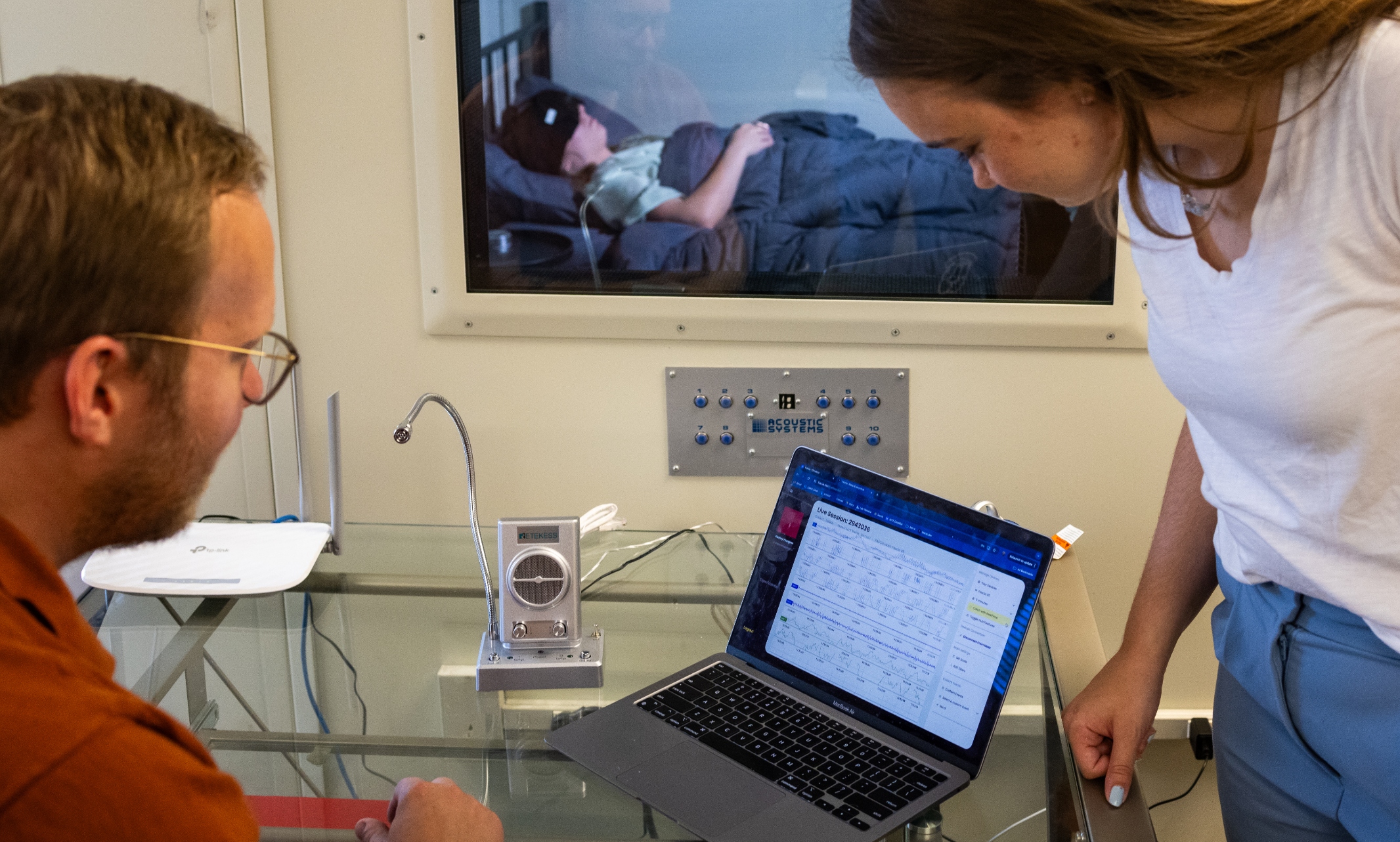
UMKC researcher studies sleep as a solution to alleviate trauma
As a student dozes off into slumber, an auditory instruction is heard through a monitor.
“Think of a tree,” says Westley Youngren, Ph.D., a psychologist, professor and researcher at University of Missouri-Kansas City, as he observes brainwaves from outside a laboratory that resembles a bedroom haven.
Instead of beakers and test tubes, the equipment in this cubed space includes a bed, nightstand, glowing salt lamp, a few serene houseplants and a two-way speaker for Youngren to communicate with his subjects. This time it’s Bailee Ehlers, a junior studying psychology, who says she is thinking about a forest as she falls asleep with an eye mask and an EEG strapped onto her to measure the electrical activity in her brain.
The sleep lab is soundproof and darkness washes over when the door is closed, leaving only brainwaves for observation from the outside.
This is done as a part of Youngren’s research to prove that imagery and thoughts can control what we dream. While dreams are a fun and happy adventure for him, he understands it may not be so for everyone - especially those who have gone through traumatic experiences, such as combat or sexual assault.
“There is a concept of how much we can control our dreams,” Youngren said. “We’ve found that most people who have chronic trauma-related nightmares don’t really feel like they have control of their dreams. It’s our goal to show that we can control our dreams, or at least influence the content of them. Having that sense of autonomy could help with their treatments down the road.”
Youngren and his research were recently featured in an American Psychological Association cover story about how disturbing dreams, like nightmares, heavily influence sleep quality, leading to long-term effects on individuals’ mental, emotional and physical health.
“There’s a good amount of research suggesting that treating sleep and nightmares can help trauma-related symptoms overall,” Youngren said in the article.
Ehlers is not just a research subject, she is also one of Youngren’s research assistants. Being on both sides of the research provided Ehlers with additional insight.
“I was a subject before a research assistant, so it helped me experience what other subjects feel when they participate in the study,” Ehlers said. “Seeing that you can influence your thoughts resulting in a better quality of life is really interesting. When dealing with trauma, it can be easy to feel helpless, but this research can help show individuals the power to change the effect it has on them is within themselves. They just need to be shown how.”
Youngren hopes to bring joy back to dreaming through his research.
“I think dreams can be a fundamental part of joy in life,” Youngren said. “Some of my favorite moments in life are sharing the cool dreams I had with other people. So, a big picture of my research is asking how we can bring the joy of dreaming back into every individual’s life.”
Oct 08, 2024
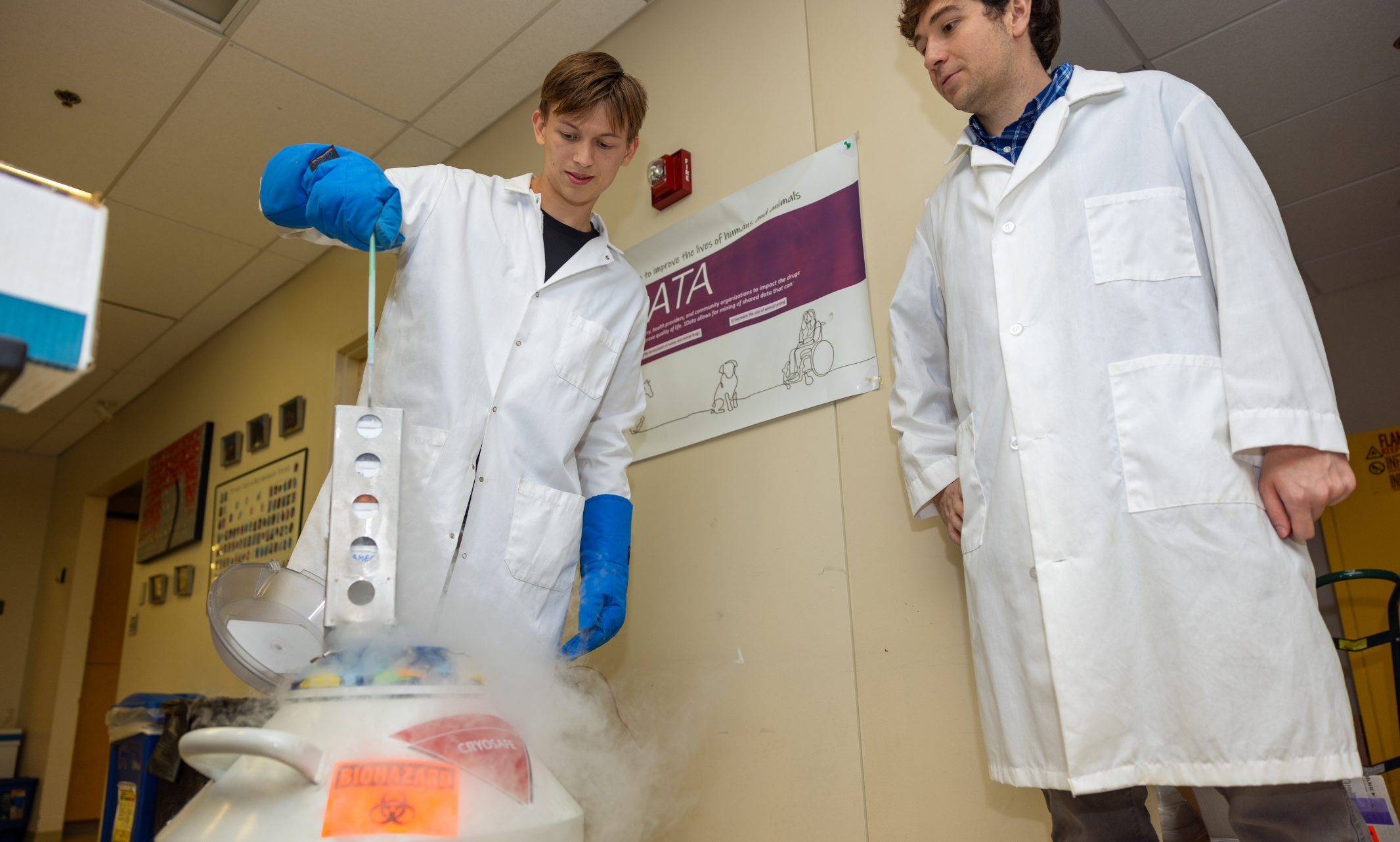
High school- and college-age students are introduced to pharmacy earlier than ever before with a UMKC summer internship
For the next generation of healthcare workers, the starting line is earlier than ever, thanks to the University of Missouri-Kansas City School of Pharmacy. There, future students are getting early exposure to pharmacy during their high school and undergraduate years.
This past summer, a cohort of students working under Drinnan Sante, a Ph.D. candidate in the School of Pharmacy, experienced hands-on learning every week in a new internship program at the school designed to expose young learners to the profession years before having to make any career decisions.
Sante is researching the way medications are delivered to the body. More specifically, how to target treatment to only the affected areas of the brain or body that need a drug. His goal is to work towards a cure for Alzheimer’s disease, which affects 6.9 million people in the United States alone.
Sante assembled a team of high school and undergraduate interns who assisted him about 20 hours per week. The goal of the program was to give the students experience in a lab, which will give them a leg up in their studies.
UMKC School of Pharmacy Dean Russell Melchert, Pharm.D., knows that early introduction to the discipline helps show potential students the versatile career paths in pharmacy.
“We like to welcome all who are interested in learning more about pharmacy and pharmaceutical sciences,” Melchert said. “Whether they end up wanting to go into one of the many different areas of pharmacy practice or into research, we are trying to get students some hands-on experience and a greater understanding of the many rewarding career pathways our graduates take.”
“This part of the medical field isn’t super obvious when you’re younger,” Sante said. “You think either doctor or dentist, but there’s a whole field where you can do research and actually try to help cure diseases that aren’t cured yet, and this project is a little window into that.”
For recent Blue Valley West High School graduate Cooper Canfield, the opportunity to participate in this research and assist Sante came after conversations with Steve Stoner, Pharm.D., the school’s associate dean for student affairs, when he spoke to the high school’s pre-med club.
“He was talking about some neuroscience research that was happening in the lab over here and I spoke to him afterwards and said, ‘That sounds interesting. Is there any way I can get in a lab and get into all this?’ and he said, ‘Absolutely,’” Canfield said.
Canfield enrolled at the University of Kansas this fall as a chemistry major and neuropsychology minor, and is considering a career in pharmacy down the line.
“It’s the perfect combination of neuroscience and chemistry,” he said.
St. Pius High School senior Meet Kaur was interested in pharmacy from an early age, and her summer spent doing hands-on work at UMKC was a step up from her earlier shadowing experiences.
“I’ll go volunteer at hospitals here and there, but it’s not the same as being in a lab and getting the experience,” Kaur said. “I’m learning before college even starts.”
Anay Chatterjee, a sophomore at Olathe North, was the youngest of the group, earning pharmacy lab experience years before other students do. A large part of his internship was honing lab safety skills that he can bring back to his classroom at Olathe North.
“I worked in a biosafety cabinet, where you work with sterile objects,” Chatterjee said. “The safety procedures that I’m running here are really important, because we also have biosafety cabinets back in my high school.”
Chatterjee is working to fill gaps in his resume to make him a competitive college applicant and someday, be accepted into medical school.
The older the student, the more involved the role they play in assisting Sante’s research. For Jacob Suchman, a sophomore studying biology at Davidson College in North Carolina, the summer was a chance to keep his skills sharp.
Suchman worked with a nanopore, a tool commonly used in labs to determine DNA and RNA sequences.
“There’s all sorts of tools that I’ve learned how to use,” Suchman said. “I’m helping Ph.D. students, like Drinnan and some of his colleagues, as they learn and understand nanopore like I am, and figure out how to use it best for their Ph.D. dissertations and other work.”
“It’s given me a great insight on Drinnan’s day-to-day life as a Ph.D. student and the challenges he has to work with,” Suchman said. “I would like to do something similar to what he’s doing.”
Program director, Gerald Wyckoff, Pharm.D., has seen the benefit of the summer program for budding pharmacists.
“It was fantastic to have students in our labs this summer and we enjoyed seeing them make connections in the lab to what they may have seen in their studies,” he said. “Our graduate students were truly an excellent asset in ensuring the success of these summer experiences.”
Interested in getting hands-on experience at the School of Pharmacy next summer? Reach out to Gerald Wyckoff at wyckoffg@umkc.edu.
Oct 07, 2024
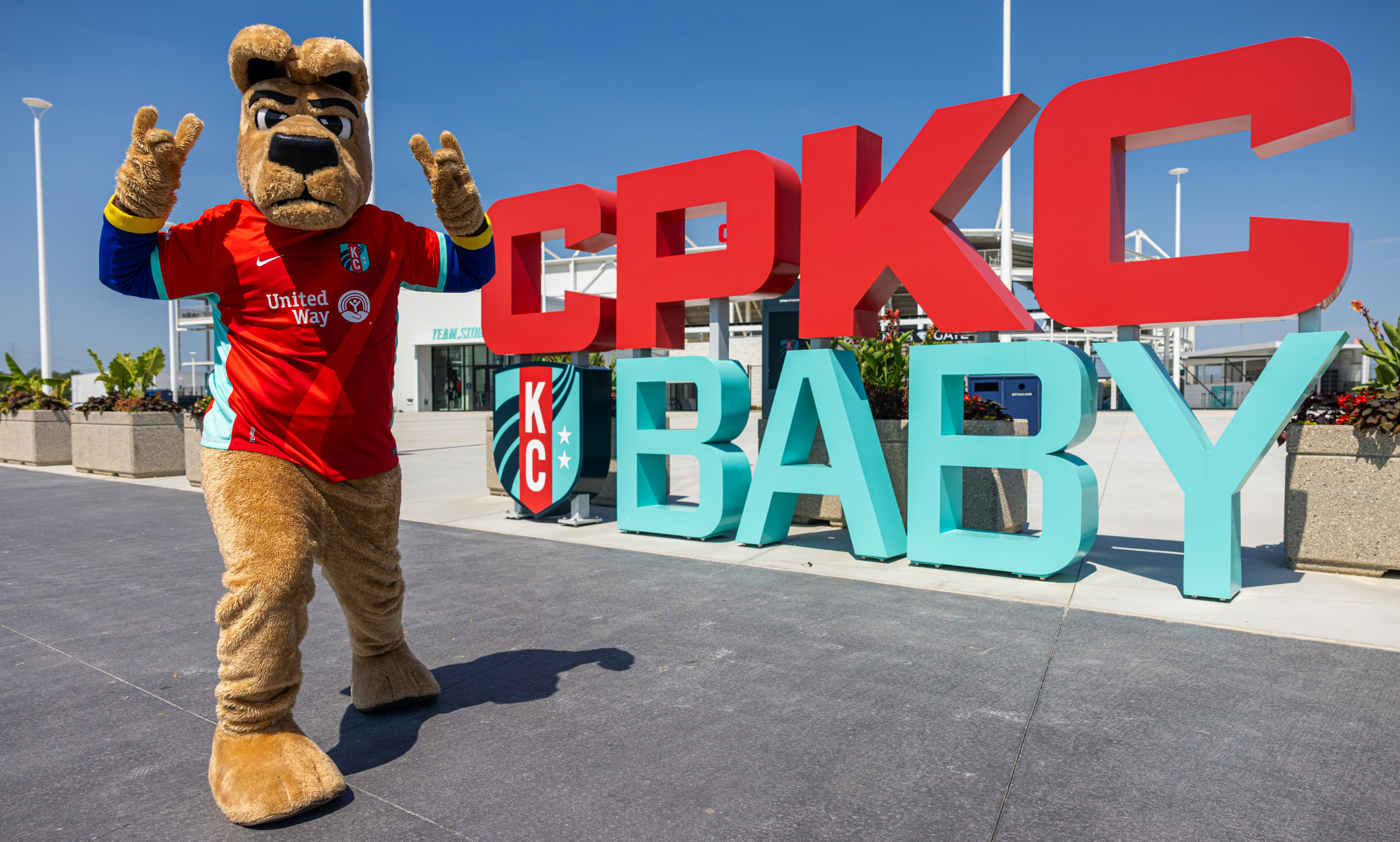
Both CPKC Stadium and The Rabbit hOle have UMKC ties playing prominent roles in the success of these attractions
TIME recently announced its annual list of the World’s Greatest Places to visit, and two Kansas City spots with UMKC ties were recognized.
CPKC Stadium and The Rabbit hOle were named on the media company’s list as extraordinary destinations among hotels, restaurants, attractions and more.
CPKC Stadium opened earlier this year, cementing its status as the world’s first stadium built for a women’s professional sports team. The world-class facility includes FIFA-approved turf pitch and dedicated spaces for wellness, recovery and weight training for the Kansas City Current players.
UMKC is a higher-education partner with the Current, and that agreement includes Current player mentorship of UMKC women’s soccer players and UMKC educational opportunities for Current team members.
UMKC alumni serve as top KC Current leaders. Monica Ngo (B.A. ’08) is the vice president of human resources and Maggie Walters (L.L.M. ’15) is general counsel. UMKC faculty Meg Gibson, M.D., is a physician for the Current.
Current founders and co-owners Angie Long and Chris Long were named Kansas City Entrepreneurs of the Year by UMKC for their leadership roles at Palmer Square Capital Management and their work with the Current, both powerful platforms that are leading the way in making positive global change.
The Rabbit hOle is a museum experience in North Kansas City that celebrates children’s literature for people of all ages. With three floors, visitors are able to explore immersive and multi-sensory narrative landscapes from various children literature tales.
UMKC alumni also serve as significant members of the Rabbit hOle, with Iris Appelquist (B.A. '21) as the current human resources manager and Emily Hane (MPA ’15) previously serving as the development director.
The governing board of the Rabbit hOle also has a UMKC alum, Larry Taft (MBA '91).
“Knowing our alumni are making an impact that is not just recognized in Kansas City, but also worldwide, is exciting,” Kaity Woody, assistant vice chancellor of Alumni Relations and Annual Giving, said. “It is a true testament to how UMKC is also a world-class university in a world-class city.”
Oct 04, 2024
